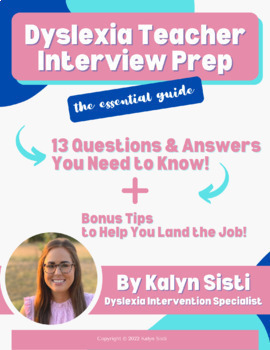13 Questions and Answers for a Dyslexia Interventionist Interview

What educators are saying
Description
Yay! I’m SO excited for you to join the amazing world of dyslexia intervention! Now to prepare for that interview…
If you Google, ”How to prepare for a dyslexia interview” what you will see are lots of links with tips on how to interview WITH dyslexia but none on how to interview for a job IN dyslexia. I came to this conclusion when I was trying to prepare for my first interview as a dyslexia interventionist. I then learned that I had to seek out information from other sources around me, and have compiled that information here for you upon being offered the job. One thing I will say, becoming a dyslexia interventionist has changed my life in the BEST way. I hope you find this resource helpful and I’m wishing you the best of luck on your interview! :)
Ex. Questions:
1. Tell us about your background in teaching reading.
2. What is dyslexia?
3. Why do you want to be a dyslexia interventionist?
4. What does dyslexia look like?
5. What does dyslexia instruction look like?
6. What are the most common misconceptions about dyslexia?
Ex. Question with Answer:
What might dyslexia look like in grades 4-6?
1. Difficulty reading aloud (e.g., fear of reading aloud in front of the classroom)
2. Avoidance of reading (particularly for pleasure)
3. Difficulty reading fluently (e.g., reading is slow, inaccurate, and/or without expression)
4. Difficulty decoding unfamiliar words in sentences using knowledge of phonics
5. Acquisition of less vocabulary due to reduced independent reading
Use of less complicated words in writing that are easier to spell than more appropriate words (e.g., big versus enormous)
PLUS Helpful Tips that I have learned over the years when interviewing for this position!



